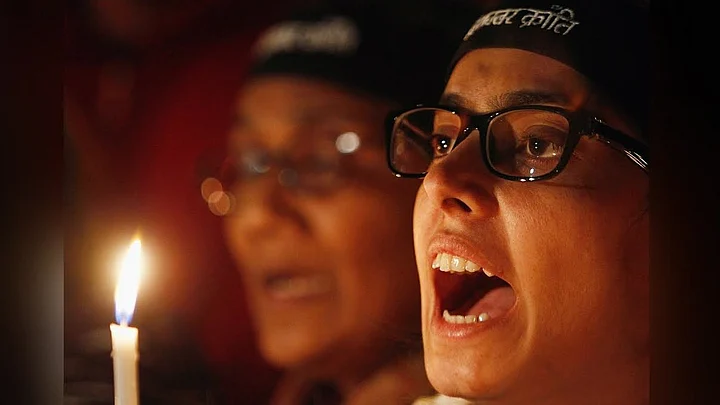A set of recent incidents involving gruesome rapes of women across the country has yet again raised several questions about Indian society and judiciary. We at The Quint believe that a rape survivor’s life doesn’t end when she is raped. And that even if our institutions - law, the judiciary, the hospitals - are failing a rape survivor, we as a society need to step up. And keep the fight going. We are publishing this article originally published on 8 November 2015 from The Quint’s archives as part of our #KeepFighting campaign.
The hottest news debate over the past couple of weeks has been the returning of National Awards. The international media, like The Guardian, has been reporting prominently on how a host of Indian writers have returned top national awards in a protest against what they refer to as a “climate of intolerance” in the emerging economic power.
Over 40 novelists, essayists, playwrights and poets have now given back awards from the country’s most prestigious literary institution, the Sahitya Akademi. Now, 24 more filmmakers, writers, cinematographers among others have also announced their decision to return their National Awards against “the threat to the academic culture at the Film and Television Institute of India (FTII)” and “the horror at people being attacked and killed for their beliefs”.
The decision was announced at a press conference on Thursday. The list includes noted filmmakers Saeed Mirza, Kundan Shah, writer Arundhati Roy, cinematographer Satya Rai Nagpaul, documentary filmmakers Madhushree Dutta, Sanjay Kak and Ajay Raina.
#AwardWapsi for Rape has no Takers
As a writer, I have found myself deliberating about this almost tidal wave of returning National Awards. I have been asked often, by my friends and readers which side of the fence I sit on and whether I am for the motion, or against it.
Many claim this is a populist, politically motivated controversy – taking on a more global dimension when Salman Rushdie told a UK television network that the failure of Prime Minister Narendra Modi to take swifter action was perpetrating a new “degree of thuggish violence” in India.
Here’s my view, and this may or may not be seen as a direct response to the mob who beat an innocent man to death in Dadri – or the murder of Malleshappa Kalburgi, award-winning scholar whose criticism of what he perceived as false beliefs had allegedly outraged Hindu extremists.
But, here’s what’s surprising, and why I will not be swayed by a sensational herd instinct. For one, awards mean nothing. And for another, as an Indian woman I can’t help but question why none of these so-called stalwarts of Indian intelligentsia ever thought of returning their coveted trophies when a woman is gangraped in an obscure Indian village or in a moving bus or in the darkness of her bedroom?
Did they protest when marital rape wasn’t criminalised? Or when gay marriages weren’t legalised? What about when kissing causes a furore? When children as young as four are gruesomely gangraped in the heart of the national capital? When item numbers serially stereotype a woman to her lowest common denominator and politicians tell us how many children we should or should not bear?
The Two-finger Test and Kapil Sharma Still Rule Indian Sensibilities
Ours is a country that repeatedly and steadfastly makes a farce of the fast track courts. An archaic two-finger vaginal test still probes our insides to determine our virginity – and acid attack victims languish. And what of prime time television? People like Kapil Sharma rule the roost – poking fun at transgenders and his pot-mouthed wife – while the whole nation claps and howls in laughter.
Did the intelligentsia remember the tales of dowry deaths and the abortions of female foetuses? Every year, during the most boisterous celebrations of Durga Puja, a pre-pubescent girl is worshipped as the highest avatar of the Mother Goddess – in a ceremony ridiculously titled Kumari Puja. When you juxtapose that to the numbers of girls being trafficked every hour, every day, you begin to gawk at the disparity.
Is Rape Not as Fashionably Political as Religion?
The question is – why the double speak now? Why the valour with the ‘ghar wapsi’ of the National Award? Has rape made us immune? Isn’t it as fashionably political as religion? Isn’t a woman’s mangled insides, her mutilated womb, her nakedness not reason enough to return something? Take a stand against the establishment, the powers that be, the Government that promotes #selfiewithdaughters, but does nothing to secure the girl child’s future that continues to bleed.
Soon, the 16-year-old (then) rapist in the Nirbhaya case will walk free, after three years of rehabilitation at a juvenile home. “Before Nirbhaya boarded the bus, he had tried to convince another girl who was alone, but that failed when she hailed an auto,” says his counsellor – who adds that for the minor, the brutalising was all about proving his masculinity!
Is the battle of womanhood only a clarion call for feminists?
(The writer is an ex lifestyle editor and PR vice president, and now a full-time novelist and columnist on sexuality and gender, based in Delhi. She is the author of ‘Faraway Music’ and ‘Sita’s Curse’. Her third book ‘You’ve Got The Wrong Girl’ is out next.)
(At The Quint, we question everything. Play an active role in shaping our journalism by becoming a member today.)
